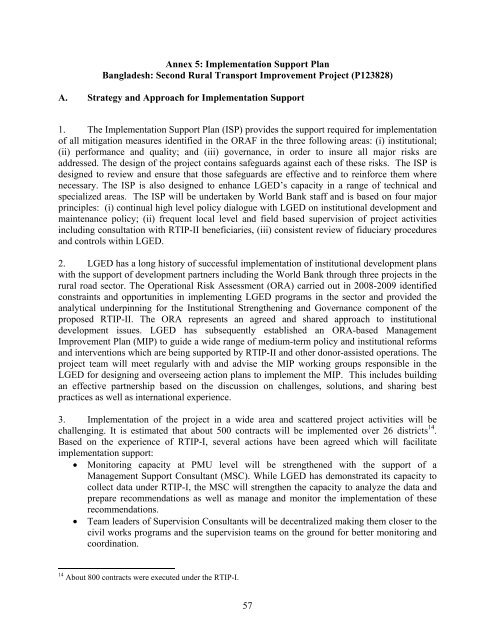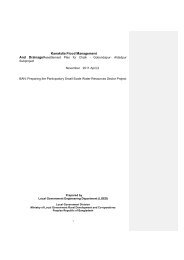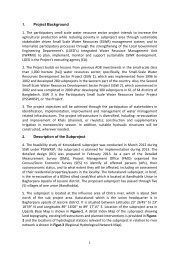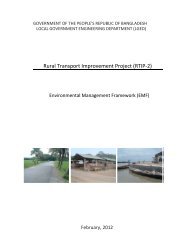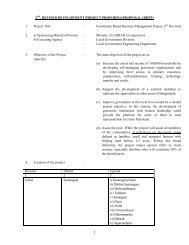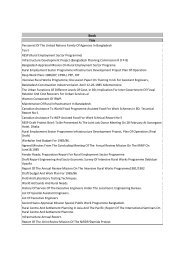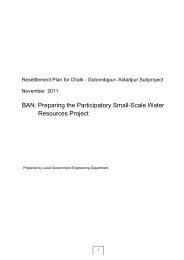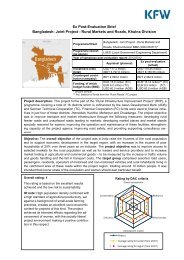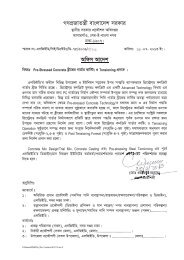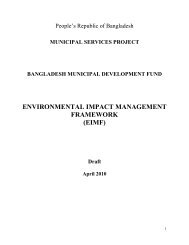PAD - LGED
PAD - LGED
PAD - LGED
You also want an ePaper? Increase the reach of your titles
YUMPU automatically turns print PDFs into web optimized ePapers that Google loves.
Annex 5: Implementation Support Plan<br />
Bangladesh: Second Rural Transport Improvement Project (P123828)<br />
A. Strategy and Approach for Implementation Support<br />
1. The Implementation Support Plan (ISP) provides the support required for implementation<br />
of all mitigation measures identified in the ORAF in the three following areas: (i) institutional;<br />
(ii) performance and quality; and (iii) governance, in order to insure all major risks are<br />
addressed. The design of the project contains safeguards against each of these risks. The ISP is<br />
designed to review and ensure that those safeguards are effective and to reinforce them where<br />
necessary. The ISP is also designed to enhance <strong>LGED</strong>’s capacity in a range of technical and<br />
specialized areas. The ISP will be undertaken by World Bank staff and is based on four major<br />
principles: (i) continual high level policy dialogue with <strong>LGED</strong> on institutional development and<br />
maintenance policy; (ii) frequent local level and field based supervision of project activities<br />
including consultation with RTIP-II beneficiaries, (iii) consistent review of fiduciary procedures<br />
and controls within <strong>LGED</strong>.<br />
2. <strong>LGED</strong> has a long history of successful implementation of institutional development plans<br />
with the support of development partners including the World Bank through three projects in the<br />
rural road sector. The Operational Risk Assessment (ORA) carried out in 2008-2009 identified<br />
constraints and opportunities in implementing <strong>LGED</strong> programs in the sector and provided the<br />
analytical underpinning for the Institutional Strengthening and Governance component of the<br />
proposed RTIP-II. The ORA represents an agreed and shared approach to institutional<br />
development issues. <strong>LGED</strong> has subsequently established an ORA-based Management<br />
Improvement Plan (MIP) to guide a wide range of medium-term policy and institutional reforms<br />
and interventions which are being supported by RTIP-II and other donor-assisted operations. The<br />
project team will meet regularly with and advise the MIP working groups responsible in the<br />
<strong>LGED</strong> for designing and overseeing action plans to implement the MIP. This includes building<br />
an effective partnership based on the discussion on challenges, solutions, and sharing best<br />
practices as well as international experience.<br />
3. Implementation of the project in a wide area and scattered project activities will be<br />
challenging. It is estimated that about 500 contracts will be implemented over 26 districts 14 .<br />
Based on the experience of RTIP-I, several actions have been agreed which will facilitate<br />
implementation support:<br />
• Monitoring capacity at PMU level will be strengthened with the support of a<br />
Management Support Consultant (MSC). While <strong>LGED</strong> has demonstrated its capacity to<br />
collect data under RTIP-I, the MSC will strengthen the capacity to analyze the data and<br />
prepare recommendations as well as manage and monitor the implementation of these<br />
recommendations.<br />
• Team leaders of Supervision Consultants will be decentralized making them closer to the<br />
civil works programs and the supervision teams on the ground for better monitoring and<br />
coordination.<br />
14 About 800 contracts were executed under the RTIP-I.<br />
57


